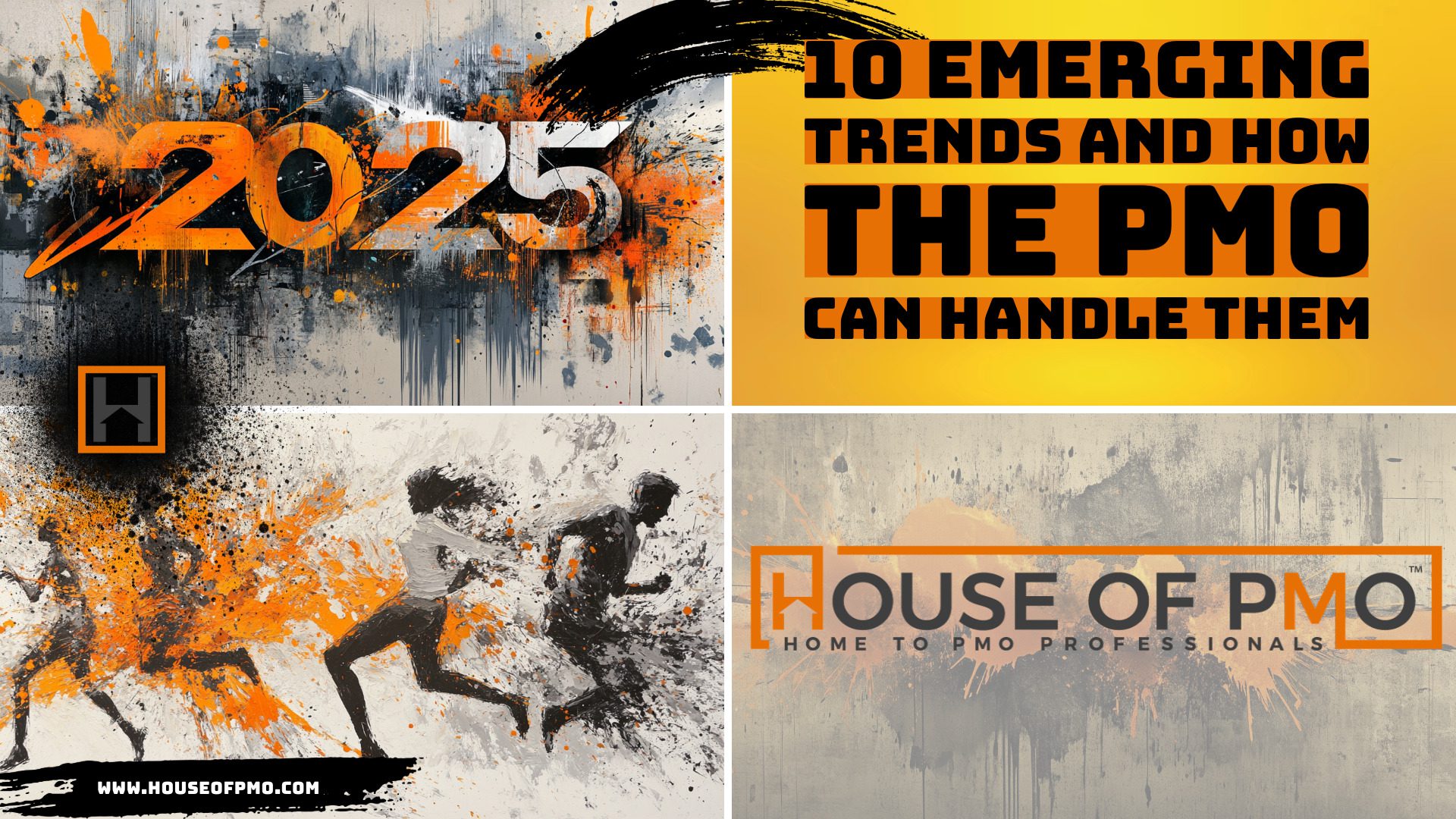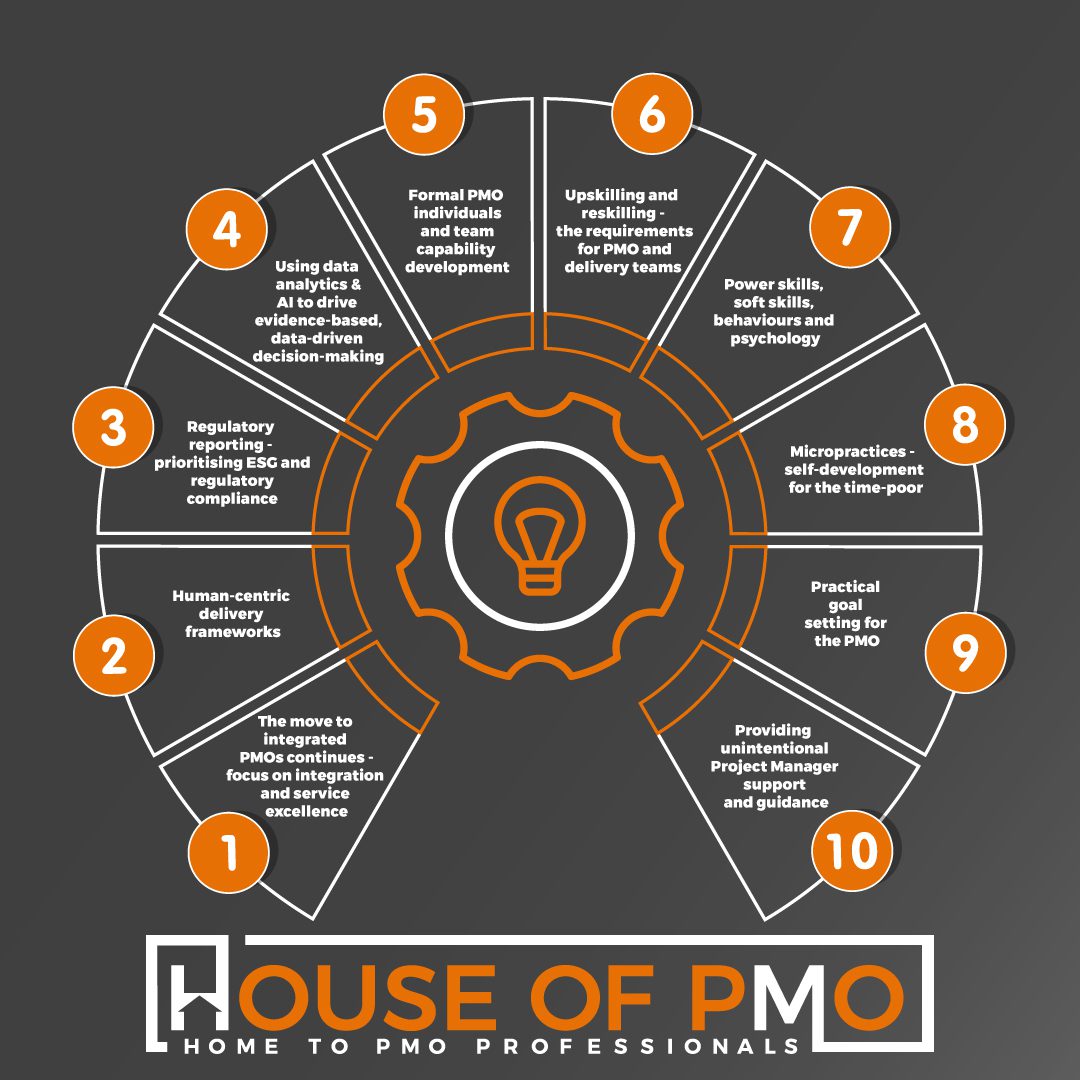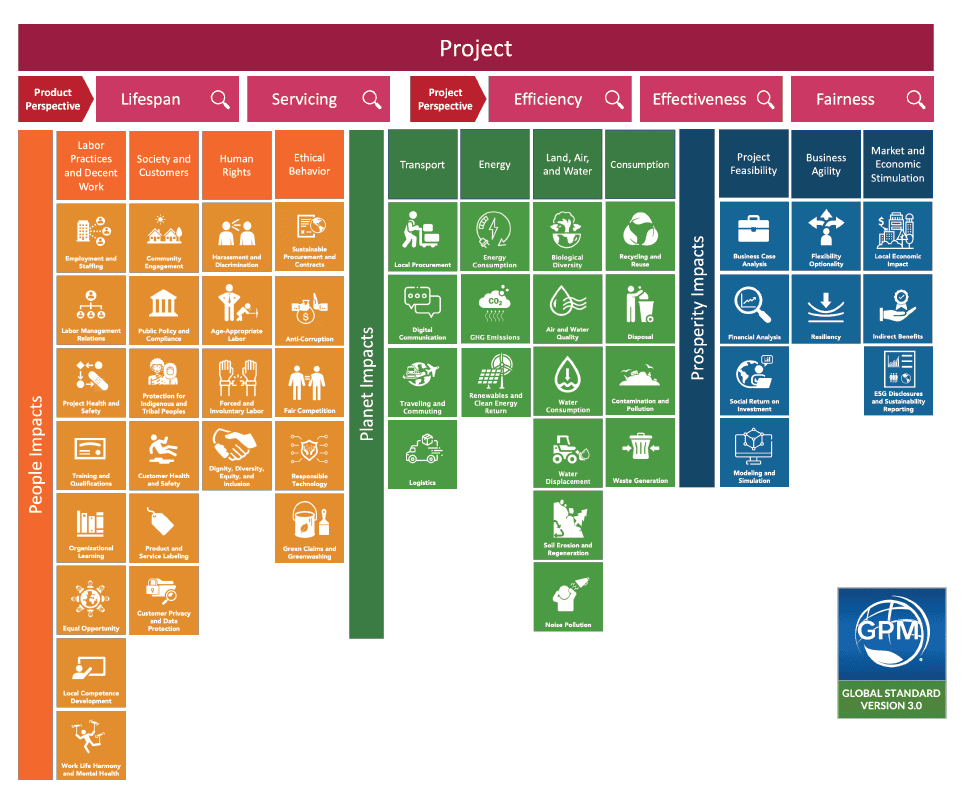You can find all our articles and past events
Free Articles | Inside PMO | PMO Conference | PMO Book Shelf
10 Emerging Trends and How the PMO Can Handle Them
In this session we kick off a New Year taking a look at the trends. You can read the whole article which was published which covers all ten of the trends or just keep on watching and reading the session notes here.
Lindsay and Eileen discussed the emerging trends for PMOs which included the need for a centralised, top-down PMO structure and the importance of collaboration, knowledge sharing, and tool usage. They also highlighted the increasing importance of regulatory reporting, the need for data analytics and AI in the PMO, and the importance of upskilling and reskilling in PMO. The conversation ended with discussions on the importance of soft skills, micropractices, setting goals for the PMO, and understanding the needs and perspectives of the organisation.
Recorded Session
Presentation Deck
Download the Presentation DeckInsights from the Session
1. Centralising PMO Services – the Integrated PMO
Eileen discussed the trend of integrated PMOs, emphasising the following key points:
Organisational Recognition:
- Organisations are increasingly acknowledging that PMOs across different areas add significant value.
- There’s a shift from isolated PMOs (focused on individual projects or programmes) to an integrated structure that supports the whole organisation.
Top-Down Design:
- Instead of a bottom-up approach where individual PMOs operate in silos, organisations are moving towards a top-down design for PMO structures.
- This approach ensures that PMOs are aligned and collectively contribute to business success.
Collaboration Between PMOs:
- Many PMO professionals report limited interaction with other PMOs in their organisation.
- Eileen highlighted the importance of fostering collaboration between PMOs to share services, tools, and practices.
Community of Practice:
- Establishing a PMO community of practice can facilitate knowledge sharing, improve consistency in service delivery, and leverage specialised expertise within certain PMOs.
Shared Tools and Standardisation:
- Organisations are exploring synergies in tools and systems used by different PMOs.
- A unified or “single-instance” tool can enhance consistency in terminology, reporting, and processes across the organisation.
Practical Steps for Integration:
- Eileen suggested practical actions like introducing yourself to other PMOs, comparing services, and looking for opportunities to work together.
- She also encouraged aligning PMO goals and services with overarching organisational objectives.
- The overall focus was on leveraging PMOs as a cohesive business function to enhance consistency, collaboration, and efficiency.
2. Adaptability in Delivery
Lindsay then discussed the importance of considering the human element in project delivery, referencing John Adair’s Action Centred Leadership and the Double Institute’s Half Double Methodology. She also introduced the concept of context-aware models and biomes of delivery, suggesting that delivery frameworks should be tailored to the specific context of each project.
Lindsay emphasised the need for adaptability and flexibility in project delivery, and the importance of staying ahead of trends.
3. Regulatory Reporting and Sustainability Requirements
Eileen discussed the increasing importance of regulatory reporting, particularly in the context of sustainability, environmental, social, and governance reporting. She highlighted that any new project or programme must now demonstrate a reduction in paper products, energy, and carbon footprint. There is also the need to understand and embed these requirements into project and programme delivery frameworks. She mentioned the importance of horizon scanning to anticipate upcoming trends and regulatory targets.
4. PMO Data Analytics and AI Importance
The discussion around the trend of project data and AI highlighted several key points:
1. AI’s Growing Influence:
- AI is increasingly becoming a part of project management, with some organisations already seeing its impacts.
- In 2024, generative AI (e.g., tools like ChatGPT) took centre stage, helping PMO and project managers understand the potential of AI tools to enhance productivity.
2. Beyond Generative AI:
- While generative AI was a major focus, attention is now shifting back to other forms of AI, such as robotic process automation (RPA).
- RPA is particularly valuable for automating repetitive tasks, freeing up time for PMO professionals to focus on higher-value activities.
3. Challenges in AI Adoption:
- Many PMO professionals feel unprepared or lack the necessary skills to fully leverage project data analytics and AI.
- This gap emphasises the need for upskilling and education in data literacy and AI application.
4. Cross-Functional Collaboration:
- Implementing AI in project management is not a standalone PMO initiative; it requires collaboration across the organisation.
- Teams such as marketing, finance, and HR are also exploring AI, and the PMO must be a key player at the table.
5. Practical Steps for AI Integration:
- Curiosity: Staying curious and exploring new tools and techniques is essential for PMOs to keep up with AI advancements.
- Upskilling: Leveraging apprenticeships, short courses, or micro-learnings to build basic and advanced AI skills within PMO teams.
- Organisational Role: PMOs should be actively involved in company-wide discussions on AI, ensuring the project management perspective is represented.
6. Future Plans and Opportunities:
- There are plans to share case studies and success stories of PMOs leveraging AI effectively, with a focus on award-winning examples.
- Conferences and sessions will delve deeper into practical applications of AI and project data analytics in PMO environments.
5. Formal PMO Development and PMO Profession
For Trend 5: Formalizing PMO Development as a Profession, the discussion covered the following points:
- Professionalisation of PMO Roles:
- There is a growing emphasis on establishing PMO roles as a recognised profession with clear career pathways, structured development plans, and defined competences.
- Defining Roles and Responsibilities:
- Organisations are focusing on creating clear job descriptions, responsibilities, and a job family structure for PMO roles, aligning them with broader organisational needs.
- Competency Frameworks:
- PMOs are increasingly using tools like competency frameworks to identify skill gaps, assess team capabilities, and tailor training and development activities accordingly.
- Clear Pathways for Growth:
- Many PMO professionals have faced challenges due to the lack of defined career progression. Formalised pathways are being introduced to guide individuals from entry-level roles to advanced positions.
6. Upskilling and Reskilling in Project Management
Lindsay and Eileen discussed the importance of upskilling and reskilling in the context of project management. They highlighted the need for continuous learning and adaptation to new methodologies and technologies, such as AI and sustainability. Eileen shared a personal example of how reskilling can be challenging, but emphasised the importance of embracing change and adding value to the organisation. They concluded by suggesting that PMO professionals should build reskilling into their roadmap and lead the way in adopting new skills and methodologies.
- Structured Development Paths:
- Organisations are encouraged to create clear pathways for PMO roles, including training needs analysis, formal development plans, and competency frameworks, to ensure PMO teams are skilled to meet evolving demands.
- Embracing Change:
- Reskilling is often needed to adapt to significant changes, such as new tools, methodologies, or technologies like AI, which can feel daunting but is critical to maintaining relevance and delivering value.
- Practical Support for Growth:
- PMOs can leverage corporate initiatives like apprenticeships, coaching, and knowledge-sharing communities to upskill teams, focusing on emerging areas like data analytics, sustainability, and advanced project management techniques.
7. Soft Skills and Competency Framework
Eileen highlighted that soft skills, rebranded as “power skills,” are critical for PMO professionals, especially as organisations become flatter and remote work challenges traditional communication and influence dynamics. Highlights included:
- Power Skills Importance: Soft skills, now referred to as “power skills,” are vital for communication, influence, and relationship-building in PMOs.
- Remote Work Challenge: Remote working has eroded confidence and natural communication skills, increasing the need for deliberate skill-building.
- Competency Framework Integration: Embedding soft skills into competency frameworks ensures they are formally recognised and cultivated.
- Behavioural Focus: Key behaviours like transparency, active listening, and effective influence are essential for PMO success.
- Practical Development: Coaching, feedback, and deliberate practice are recommended for developing and reinforcing these skills.
8. Microlearning and Practices Discussed
Lindsay discussed the concept of micro-practices, which originated from mindfulness and Covid times. Microlearning, when combined with microaction, can lead to significant improvements. Lindsay asked if the participants’ organisations offer access to microlearning platforms and encouraged them to reflect on their work, as exemplified by Eileen’s 5-year diary practice. Micropractices will likely become more prevalent in 2025 and will be a focus at the House of PMO throughout 2025.
An example of Microlearning to Micropractice and Microaction in a PMO Context:
Microlearning:
- A short, focused training session or e-learning module on effective stakeholder communication, on techniques like active listening and summarising key points.
Micropractice:
- Practising active listening by engaging in role-play during team meetings or mock project reviews, focusing on acknowledging and paraphrasing stakeholders’ concerns.
Microaction:
- During a real project update meeting, actively listen to a stakeholder’s feedback, summarise their input to confirm understanding, and document agreed actions to ensure alignment and build trust.
9. Setting PMO Goals and Measuring Success
Eileen discussed the importance of setting goals and objectives for the PMO over the next 6 to 12 months. PMOs need to think beyond just what tasks will be done and to focus on the outcomes and value that the PMO will deliver. The PMO should be thinking about how it measures success and reports on the PMO’s success, not just the projects being delivered. She suggested linking project and PMO metrics and understanding how everyone contributes to the organisation’s success. Lastly, she stressed the importance of regular communication of progress to stakeholders.
The discussion around goals and metric setting in the PMO context included the following key points:
- Aligning Metrics with Organisational Objectives:
- PMOs should ensure that goals and metrics are directly aligned with the organisation’s strategic objectives to demonstrate value and relevance.
- Focus on Outcome-Based Metrics:
- Emphasis was placed on moving beyond activity tracking (e.g., number of reports generated) to outcome-focused metrics like project delivery success, benefits realisation, and stakeholder satisfaction.
- Adaptability and Context-Specific Metrics:
- Metrics should be adaptable and reflect the unique context of the PMO and its projects, ensuring they are meaningful and actionable rather than rigid and generic.
- Consistency and Standardisation:
- Establishing consistent and standardised metrics across the organization fosters comparability, transparency, and clarity in performance evaluation.
- Driving Decision-Making:
- Effective metrics are not just for reporting but should actively inform decision-making, highlight risks, and guide portfolio prioritisation efforts.
10. Accidental Project Managers
Lindsay discussed the ‘accidental project managers’ concept within organisations, where individuals are promoted to deliver projects without proper training or experience. She suggested that PMOs could provide targeted support to these individuals, potentially leading to quicker project delivery and a quicker return on investment. You can check out the session on accidental project managers here.



